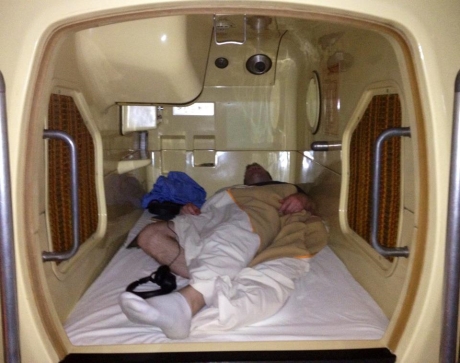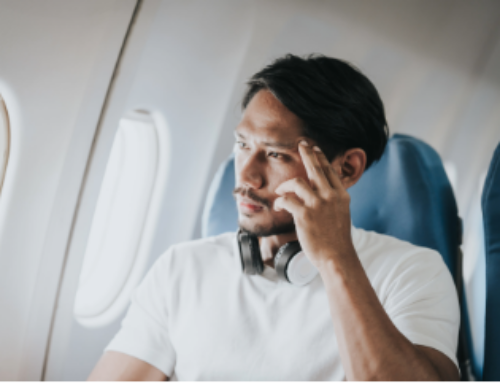I lay awake in a cramped fiberglass box, sleepless from the echoes of snoring that surrounded me. An alarm clock seemed to go off every time I started to fall asleep. I had made a terrible mistake in the name of adventure.
Throughout my travel experiences, I’ve found a way to fall asleep in hostel dormitories packed with rowdy Australian travelers, dirty hotels that more than likely had bedbug infestations and on the couches of strangers. None of those experiences would prepare me for the Japanese equivalent of a cheap room.
I spent one night in a capsule hotel in Nagoya, Japan. It was my first and it would be my last.
To call this form of accommodation a hotel is giving it more credit than it deserves. Capsules are tiny plastic cubicles stacked in rows by the dozen. Most capsules are very small – a little more than 6 feet deep and 3 feet wide. Each is outfitted with only a mattress, a thin sheet, a hard rice pillow and a small TV-radio.
Capsule hotels offer a place to sleep for travelling salarymen, people who miss the last train, men who can’t come home to their wives or the newly unemployed who can no longer afford rent.
So why would I ever choose to stay at a place that sounds so bleak?
To me, capsule hotels always seemed like an alien curiosity that you could only find in Japan, like smoke-filled pachinko parlors or those unsavory vending machines that sell used personal items you hear rumors about. While I never found those vending machines (I’ve heard Akihabara district of Tokyo may have a few), I stumbled across a capsule hotel near a train station in Nagoya. Next door was a pachinko parlor.
I was vacationing in Japan with an equally adventurous friend from the United States and an ex-patriot who lived in Tokyo. After an evening of discussion and drinks with a large group of locals we had befriended, we had made up our minds: we would sleep in a capsule that night instead of a hotel.
The group seemed entertained by our choice of accommodation. None of them had ever even considered staying in a capsule. I couldn’t tell if they were impressed by our bravery or just amused that two foreigners would willfully subject themselves to a capsule.
My ex-patriot friend who was fluent in Japanese would navigate the check-in process for us. He had known better and booked a hotel room down the street but was willing to help. To get to the capsule hotel, we had to take a small elevator to the eighth floor of a commercial complex. The elevator opened to an otherwise normal looking hotel lobby.
Once we had checked in and paid the equivalent of about $25, we were each handed a numbered locker key and a pair of suspiciously dingy blue pajamas. I felt like an inmate the entire time I wore my capsule uniform.
I had to walk through a smoke-filled common room to get to the capsules. A dozen older men, dressed in the same blue scrubs, were sitting on old couches, smoking and watching TV or reading manga. A sliding glass door in the back of the common room led to the main attraction.
If I didn’t know any better, I’d have thought I stepped into the largest laundromat I’d ever seen. The capsules were stacked in rows, each with a circular doorway in front, much like a spin cycle dryer. A small bamboo shade covered the entrance of the occupied capsules. From my estimates, at least a hundred people would be sleeping beside me.
I climbed up a small ladder and ducked into my assigned capsule. At 5’11” I could barely sit up without hitting my head on the ceiling. I closed the bamboo shade to go to sleep.
My discomfort intensified as I tried to sleep. I’ve never been claustrophobic, but I had no room to stretch or change my sleep position. Light seeped in through the near-useless shade.
It was far from quiet. Every noise echoed off of the fiberglass capsule walls. At least six people were snoring. My neighbor’s tossing and turning sounded like a minor tremor. Further down, someone was coughing into a megaphone.
Beginning at about 3 a.m., alarm clocks started going off. I tried to get whatever sleep I could between the disruptions.
By 7 a.m., I was fed up with trying to sleep in a fiberglass pod. My friend, who was sleeping in a nearby capsule, had a similarly restless night. We snapped a few photos and left without looking back.
Reflecting on the experience, I can’t say I regret spending that night in what I affectionately refer to as “space prison.” It helped me truly appreciate my own bed, and for that matter, every other accommodation I’ve had in my life.
If you ever visit Japan, a capsule hotel is worth considering for a night. Just don’t expect to actually sleep.





